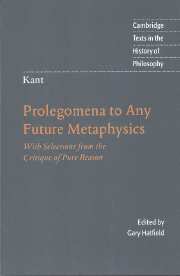Book contents
- Frontmatter
- Contents
- Acknowledgments
- Introduction
- Chronology
- Further reading
- Note on texts and translation
- Prolegomena to Any Future Metaphysics
- Table of Contents
- Preface
- Preamble
- General Question of the Prolegomena
- General Question
- The Main Transcendental Question, First Part
- The Main Transcendental Question, Second Part
- The Main Transcendental Question, Third Part
- Solution to the General Question of the Prolegomena
- Appendix
- Selections from the Critique of Pure Reason
- Index
- Cambridge texts in the history of philosophy
General Question of the Prolegomena
Published online by Cambridge University Press: 05 June 2012
- Frontmatter
- Contents
- Acknowledgments
- Introduction
- Chronology
- Further reading
- Note on texts and translation
- Prolegomena to Any Future Metaphysics
- Table of Contents
- Preface
- Preamble
- General Question of the Prolegomena
- General Question
- The Main Transcendental Question, First Part
- The Main Transcendental Question, Second Part
- The Main Transcendental Question, Third Part
- Solution to the General Question of the Prolegomena
- Appendix
- Selections from the Critique of Pure Reason
- Index
- Cambridge texts in the history of philosophy
Summary
If a metaphysics that could assert itself as science were actual, if one could say: here is metaphysics, you need only to learn it, and it will convince you of its truth irresistibly and immutably, then this question would be unnecessary, and there would remain only that question which would pertain more to a test of our acuteness than to a proof of the existence of the subject matter itself, namely: how it is possible, and how reason should set about attaining it. Now it has not gone so well for human reason in this case. One can point to no single book, as for instance one presents a Euclid, and say: this is metaphysics, here you will find the highest aim of this science, knowledge of a supreme being and a future life, proven from principles of pure reason. For one can indeed show us many propositions that are apodictically certain and have never been disputed; but these are collectively analytic and pertain more to the materials and building blocks of metaphysics than to the expansion of knowledge, which after all ought to be our real aim for it (§2c). But although you present synthetic propositions as well (e.g., the principle of sufficient reason), which you have never proven from bare reason and consequently a priori, as was indeed your obligation, and which are gladly ceded to you all the same: then if you want to use them toward your main goal, you still fall into assertions so illicit and precarious that one metaphysics has always contradicted the other, either in regard to the assertions themselves or their proofs, and thereby metaphysics has itself destroyed its claim to lasting approbation.
- Type
- Chapter
- Information
- Kant: Prolegomena to Any Future MetaphysicsWith Selections from the Critique of Pure Reason, pp. 24 - 26Publisher: Cambridge University PressPrint publication year: 1997



